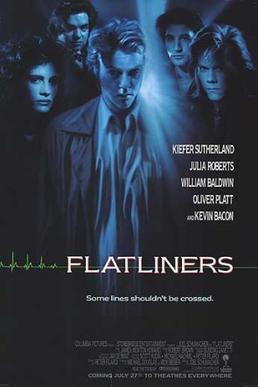I remember hearing about Flatliners when it came out. It was during an era when I wasn’t watching many movies and the idea of a movie all about dying bothered me. Well, I’m older now and I watch movies because I write about them. So I gave Flatliners a try. It wasn’t bad—a cut above what I often end up watching on a lazy winter weekend afternoon. In case your memory’s rusty, here’s how it goes: five med school students decide to experiment with controlled death and resuscitation. They do this to find out what’s after death. Confident in both science and their abilities, they one-by-one undergo the procedure to see what awaits beyond. The experience is different for each of the four that does it. It can be pleasant, or not. More not.

Then the experiences from the beyond begin to break through into their alive lives. But not the good stuff. The word that these scientists use is, interestingly, “sin.” The sins of their pasts come back to them. One of them realizes that to free himself from this haunting, he has to make amends to a person he offended as a child. The apology—and forgiveness—works. Eventually the four pay the price and, perhaps, are a bit wiser for it. This isn’t a great film but it does raise a number of issues that demonstrate how religion and horror relate. Death is a religious issue, no matter how secular someone is. As the definition of life becomes more complex, its cessation becomes more fraught. Here medical students are grappling with their very vocation. They ease suffering and prolong life.
I suspect one of the reasons the movie failed to make it big was that the “sins” are unevenly repaid. An accidental death from a childhood of bullying is the worst. A past of womanizing seems to have a relatively light, and predictable outcome. And what is the sin in discovering a war veteran parent’s addiction to an opioid? In a sense it’s classic Sunday school—you get punished for your wrongs. Some suffer, however, from mistakes that others made. Or for which others egged them on, and in which others participated. And for us vegans, even egging someone on might be a sin. The value of the movie seems to be less how it’s executed and more about the potential for discussion that it raises. Death is no stranger to cinema, and it can’t fail to make the living curious. That seems worth talking about.
